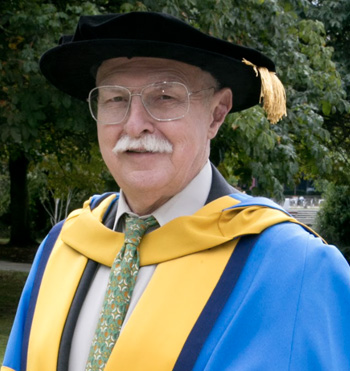Randall Collins

UNIVERSITY COLLEGE DUBLIN
HONORARY CONFERRING
Thursday, 6 September 2018 at 2.30 pm
TEXT OF THE INTRODUCTORY ADDRESS DELIVERED BY ASSOCIATE PROFESSOR STEVEN LOYAL, School of Sociology on 6 September 2018, on the occasion of the conferring of the Degree of Doctor of Literature, honoris causa on RANDALL ALFRED COLLINS.
Randall Collins is one of the world’s leading sociologists and the leading American sociologist alive today. He has made an enormous contribution to wide areas of sociology: sociological theory, the study of state formation, power, violence, social stratification, the sociology of emotions, historical and political sociology, the sociology of education and the sociology of intellectuals. He was also probably the only academic who predicted the fall of the Soviet Union long before anybody could have contemplated this possibility. His work has been widely cited, his publications are assigned as compulsory readings on graduate and undergraduate courses throughout the world, his books and articles are translated into numerous languages and he has been awarded numerous prizes and fellowships. Moreover all of his numerous books have received glowing reviews in the leading social science journals and he is regularly sought after as a keynote speaker at prestigious conferences and universities all over the world.
Furthermore his novel concepts and ideas, such as interactional ritual chains, forward panic, credential inflation, the micro-foundations of macro-sociology and the importance of emotions in sociology have had a profound impact on many social scientists including sociologists, political scientists, historians, anthropologists, nationalism studies scholars, geographers, security studies scholars. Collins is best-known for his path-breaking books that have defined several fields of sociology. His early work focused on a novel post-functionalist understanding of the sociology of education. This was followed by his powerful book, Conflict Sociology: Toward an Explanatory Science (1975), written as an attempt to integrate and synthesize the compatible elements of what are usually regarded as incompatible sociological approaches: Weberian, Marxist, Durkhemian and Goffmanian analytical traditions. Foregrounding the centrality of conflict and divergent interests in social life, Collins aimed to show that the cumulative social scientific understanding of society can help us explain a wide range of social situations. This was followed by a return to education in another pathbreaking work, The Credential Society (1979), A Historical Sociology of Education and Stratification. This book offered a novel analysis of educational credentials in contemporary world and sought to challenge the orthodox view of expanding educational opportunities as a means to prepare students for work, arguing instead that schools, especially prestigious or elite schools in the US, teach exclusionary status cultures centred on propiety and socailability, readying students for access into hierarchical occupational organzations. The continuous chase for more an better degrees coupled with the ever increasing proliferation of educational systems ultimately generates a credential inflation in which increasing numbers of individuals with higher and higher qualifications pursue relatively few high status jobs.
In his The Sociology of Philosophies: A Global Theory of Intellectual Change (1998), based on over thirty years of research, Collins explores the rise, expansion and decline of various intellectual networks throughout the course of human history. Comparing the dominant philosophical traditions of thought in ancient Greece, China, India, Japan, the medieval Christendom, the Islamic and the Jewish cultural world as well as the leading philosophical schools of modern Europe this study demonstrates how much knowledge production emerges as a collective enterprise of relatively small networks of well connected thinkers. While in Interaction Ritual Chains (2004), he exapands upon his micro-sociological studies centring on the ritualistic, routinized and emotional underpinnings of social life. Human emotions and intellectual rituals continue as core themes in his important work on violence, Violence: A Micro-Sociological Theory (2008) which examines the micro-interactional side of violent encounters and how humans actually find violence a difficult thing to enact; and more recently in Napoleon Never Slept: How Great Leaders Leverage Social Energy (2015) which focuses on the importance of emotional energy in understanding howsuccesful individuals.
These books offer novel and ground-breaking analyses of different aspects of social life through time and space. His pioeneering work focuses on three important diemsnions in the study of social relations: the social nature of individuals, the need to study these historically, and the embeddedness of interacting individuals in power contexts. Collins’s work has influenced generations of sociologists throughout the world and his publications have been translated into over 20 languages.
Professor Collin’s work contains great originality, clarity of thought, and a highly developed, articulate, and poised prose style. He is a rigorous and assiduous analyst but his writings are also accessible to a wider audience. Professor Collins is also a great lecturer and public speaker who maintains an insightful blog on current political events and social processes.
For his massive, paradigmatic, contribution to the subject of sociology, Professor Collins is awarded with the honorary title of Doctor of Letters (DLitt) by UCD.
_____________________________________________________________________
Praehonorabilis Praeses, totaque Universitas,
Praesento vobis hunc meum filium, quem scio tam moribus quam doctrina habilem et idoneum esse qui admittatur, honoris causa, ad Gradum Doctoratus in Litteris; idque tibi fide mea testor ac spondeo, totique Academiae.